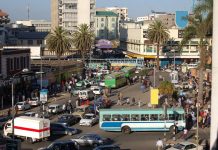 Finance minister Uhuru Kenyatta shrugged off the recent slowdown in revenue growth and submitted to Parliament a Sh1.2 trillion spending plan that is big on investment in productive sectors of the economy.
Finance minister Uhuru Kenyatta shrugged off the recent slowdown in revenue growth and submitted to Parliament a Sh1.2 trillion spending plan that is big on investment in productive sectors of the economy.
The plan, which was made public yesterday in the expenditure estimates that Mr Kenyatta submitted to Parliament, indicates that the government plans to spend Sh157 billion more in the new financial year that begins in July.
The Budget is also rich in social interventions that Mr Kenyatta hopes will help the government improve the quality of life for citizens and address supply shortages that have seen inflation rise to 12.95 per cent in May from an average of five per cent at the beginning of the year.
“We have managed to accommodate key national strategic priorities in the area of education, health, infrastructure (rail and roads), tourism, internal security and agriculture and cushioned the poor against the ravages of drought and food shortages,” said Mr Kenyatta.
Though the Treasury had set aside June 8 as budget day – the estimates were submitted to parliament this week as part of the demand that Mr Kenyatta complies with the new Constitution which requires that MPs should have access to the government revenue and spending plans two months before the end of the financial year.
Submitting expenditure plans to parliament without making known how he plans to raise the revenue, Mr Kenyatta has only half complied with the Constitution.
Failure to table the revenue estimates, which includes how the minister plans to raise the money to cover his expenditure in the new financial year, is being seen as a big signal that the new year might start with major changes in the areas of taxation such as VAT and customs duty.
The Budget plan shows that development or capital spending will take nearly Sh400 billion or 34.5 per cent with the balance of Sh754 billion going to recurrent spending.
The enhanced spending plan is being seen as an extension of the Economic Stimulus Package (ESP) whose utilisation has been hampered by poor absorptive capacity of State agencies.
Slow growth in tax revenue that has been recorded in recent months means that the mega budget may come with major adjustments in taxation.
The latest International Monetary Fund (IMF) documents have pointed to an impending overhaul of the tax system that may include a phase out of tax incentives granted to Export Processing Zones, duty-free vehicle imports by MPs, judges and military personnel and full taxation of parliamentarians’ salaries.
“In my view, the Treasury is being very imaginative. Now with that kind of investment in water resources, irrigation and roads, the fiscal side can complement monetary policy effectively,” said Mr Mbui Wagacha, an economist who is also a member of the Central Bank board.
Analysts will, however, be keenly watching how the Treasury walks the tightrope of increasing expenditure and reining in growth of the Sh1.3 trillion public debt as well as cut the deficit now standing at 7.5 per cent of GDP down towards the recommended level of five per cent.
In the fiscal year ending this month, Treasury had indicated it would spend slightly under Sh1 trillion but government ministries are expected to underutilise the cash to the tune of billions of Shillings. Yesterday, the Finance minister while acknowledging the problem told a press briefing that the absorption capacity was an issue that his ministry was addressing on a continuous basis.
Underlining the importance the Kibaki administration has accorded infrastructure development Treasury since coming to power in 2003, Mr Kenyatta has increased the money going to infrastructure by 35 per cent to Sh221 billion in 2011/12.
The administration has bulked up spending on the critical sector by a massive 1,304 per cent since 2003 when Finance minister Chris Obure had allocated the sector Sh15.77 billion as the economy wobbled under the weight of grand corruption and dwindling tax revenues.








![Top 20 Used Cars to Avoid Buying in Kenya ? [PHOTOS]](../../../blog/wp-content/uploads/2013/11/top-used-unreliable-cars-to-avoid2-80x60.jpg)

![Top 20 Used Cars to Avoid Buying in Kenya ? [PHOTOS]](../../../blog/wp-content/uploads/2013/11/top-used-unreliable-cars-to-avoid2-100x70.jpg)





